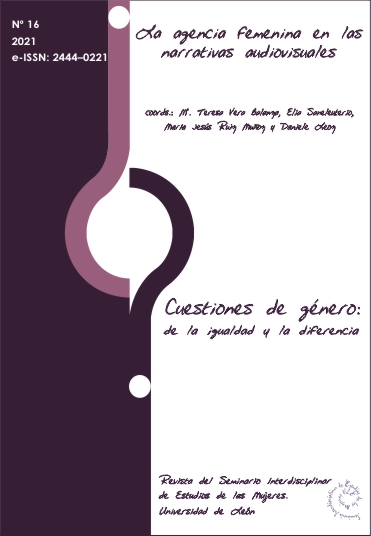An archetypal analysis of Katniss Everdeen from The Hunger Games
DOI:
https://doi.org/10.18002/cg.v0i16.6932Parole chiave:
comparative literature, myth criticism, gender theory, feminism, psychoanalysisAgenzie:
UNIVERSIDAD COMPLUTENSE DE MADRIDAbstract
Suzanne Collins’ The Hunger Games trilogy invites to reflect on the exchange of gender roles metaphorically performed by a female and male protagonists who play the warrior as well as the family protector roles. From a myth-critical theoretical framework and applying psychoanalysis in literature methodology, this article will provide a feminist analysis of The Hunger Games trilogy (2008-2020) focusing on how the protagonists, Katniss Everdeen and Peeta Mellark, deconstruct gender stereotypes. Peeta Mellark will be regarded as a future man who supports gender equality while Katniss Everdeen will be considered a representation of goddesses’ archetypes applying Carl Gustav Jung’s (1970) approach on archetypes and collective unconsciousness as well as Jean Shinoda Bolen’s (2010) theories of feminine psychology based on Greek goddesses archetypes.
Downloads
Métricas alternativas
Riferimenti bibliografici
Anam, Choerul and Taufiqurrahman, Febri (2020): “The Appearance of Gender in the Main Characters in The Hunger Games (Gender Analysis)”. In: World Conference on Gender Studies, KnE Social Sciences, pp. 102–107. Available in: https://knepublishing.com/index.php/KnE-Social/article/view/7397 [27/02/2021].
Bolen Shinoda, Jean (2014): Artemis: The Indomitable Spirit in Everywoman. San Francisco: Coneri Press.
Bolen Shinoda, Jean (1984): Goddesses in Everywoman: Powerful Archetypes in Women's Lives. New York: Harpercollins.
Cixous, Hélène (1975): “The Laugh of the Medusa”. In: Feminisms: An Anthology of Literary Theory and Criticism, Houndmills: Macmillan Press.
Collins, Suzanne (2008): The Hunger Games. New York: Scholastic Press.
Everett, Sheila (2008): “Suzanne Collins Q & A conversation”. Interview by Sheila Marie Everett, Scholastic Inc. Available in: http://mediaroom.scholastic.com/files/Suzanne_Collins_Q&A_on_Letterhead_Mockingjay.pdf [27/02/2021].
Journal Psyche (1994-2018): “The Jungian Model of the Psyche”. Available in: http://journalpsyche.org/jungian-model-psyche/ [27/02/2021].
Janes, Linda (2003): “The Gendered Cyborg: A Reader”. In “Feminist Theory and Science Fiction”, edited by Veronica Hollinger, 92. Cambridge: Cambridge University Press.
Jung, Carl G. (2014): The Archetypes and the Collective Unconscious. Translated by R.F.C. Hull, London and New York: Routledge.
Lawrence, Francis (2012): The Hunger Games: Mockingjay-Part I, Film.
Lawrence, Francis (2015): The Hunger Games: Mockingjay-Part II, Film.
Saez Garrido, Ana (2017): “Discourses of Masculinity in Suzanne Collins’ The Hunger Games Trilogy: Defending The Alternative Man, Peeta Mellark”. Trabajo de Fin de Grado. Tutor: Sara Martín Alegre. June 2017. Available in: https://ddd.uab.cat/pub/tfg/2017/180064/Saez_Garrido_ANA_TFG_2016-2017.pdf [09/06/2021].
Downloads
Pubblicato
Come citare
Fascicolo
Sezione
Licenza
Copyright (c) 2021 Maya Del Puig Zalbidea Paniagua

Questo lavoro è fornito con la licenza Creative Commons Attribuzione - Non commerciale - Condividi allo stesso modo 4.0 Internazionale.
L@s autores/as que publican en esta revista están de acuerdo con los siguientes términos:
1. L@s autores/as ceden de forma no exclusiva los derechos de explotación (reproducción, distribución, comunicación pública, transformación) a la Universidad de León, por lo que pueden establecer, por separado, acuerdos adicionales para la distribución no exclusiva de la versión de la obra publicada en la revista (por ejemplo, alojarlo en un repositorio institucional o publicarlo en un libro), con un reconocimiento de su publicación inicial en esta revista.
2. Este trabajo se encuentra bajo la Creative Commons Attribution-NonCommercial-ShareAlike 4.0 International License. Puede consultarse desde aquí la versión informativa y el texto legal de la licencia.
3. Se permite y se anima a l@s autores/as a difundir electrónicamente las versiones pre-print (versión antes de ser evaluada) y/o post-print (versión evaluada y aceptada para su publicación) de sus obras antes de su publicación, ya que favorece su circulación y difusión más temprana y con ello un posible aumento en su citación y alcance entre la comunidad académica.
Cuestiones de Género utiliza exclusivamente la licencia Atribución-NoComercial-CompartirIgual 4.0 Internacional (CC BY- NC-SA 4.0).
Bajo los siguientes términos:
- Atribución: Usted debe dar crédito de manera adecuada , brindar un enlace a la licencia, e indicar si se han realizado cambios . Puede hacerlo en cualquier forma razonable, pero no de forma tal que sugiera que usted o su uso tienen el apoyo de la licenciante.
- No Comercial: Usted no puede hacer uso del material con propósitos comerciales .
- Compartir Igual: Si remezcla, transforma o crea a partir del material, debe distribuir su contribución bajo la la misma licencia del original. cualquier uso permitido por la licencia.
No hay restricciones adicionales — No puede aplicar términos legales ni medidas tecnológicas que restrinjan legalmente a otras a hacer
L@s autores/as pueden consultar los derechos de copyright y las condiciones de autoarchivo en el directorio Dulcinea.











